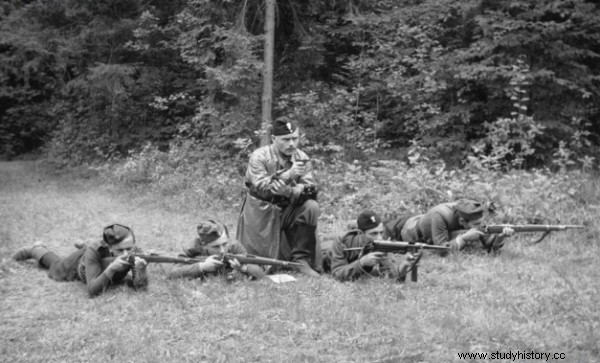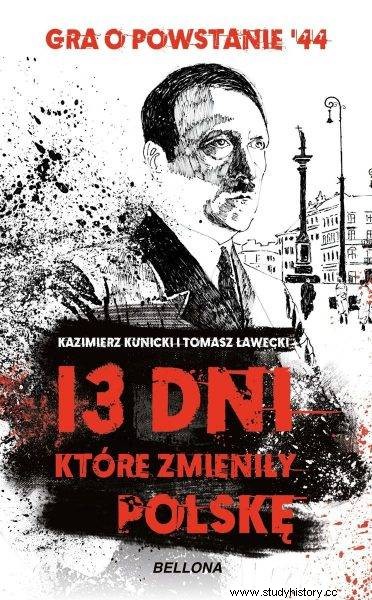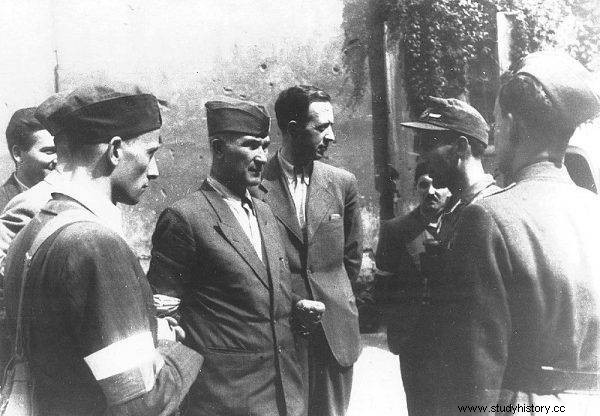Until the last moments, the commanders of the Home Army argued sharply whether to give the order to the uprising in Warsaw. Finally, Col. Antoni Chruściel, pseud. "Monter", his greatest supporter, was to see Russian tanks in the vicinity of Warsaw. With this argument he convinced the commandant of "Bor" Komorowski. This is how one of the greatest tragedies in the history of Poland began.
On June 23, 1944, the Soviet army launched the great military operation "Bagration". After July 20, the Russians found themselves on the outskirts of Lublin. Between the weakening but still strong Germany and the mighty USSR was the Underground Poland. The tragedy of her position was only deepened by the lack of diplomatic relations with Russia. Stalin did not want them, he already had his Poland, then called Lubelska - with the government and the army.
Between the Hammer and the Anvil
At that time it was already clear that there would be no uprising against Germany. The power disproportion between the German army and the Home Army was huge. Moreover, the Soviet troops moved quickly and the reality at the front changed almost overnight.
Operation "Tempest" was the answer - it was about taking up the fight against the Germans just before the arrival of the Russians. After the victorious fight, the Polish local military and civilian authorities were to reveal themselves to the Soviets as hosts, confronting them with the fait accompli.
Operation "Tempest" in Vilnius and Lviv ended in a catastrophe. Although it was possible to liberate both cities by joint forces (Polish ones were too weak for independent victories), the consequences were the arrests and liquidation of the Home Army structures in those areas. The greatest forces - approx. 20 thousand. underground soldiers - the "Tempest" was still carried out in the Lublin region with a similar effect. Warsaw was excluded from the action.

Operation "Tempest" in Vilnius and Lviv ended in a catastrophe.
The more the situation became dramatic, the more intensively arguments were sought that could strengthen Polish negotiating power against the USSR and the Allies. Warsaw was more and more eagerly indicated as one of them.
There were many supporters of the outbreak of the uprising in the city in the government in exile. The commencement of the fighting was to strengthen the position of Prime Minister Stanisław Mikołajczyk before the planned meeting with Stalin. The Commander-in-Chief, Gen. Kazimierz Sosnkowski, opposed the outbreak of fighting in Warsaw. He issued an order forbidding the operation of the Operation Tempest in Warsaw. It did not arrive on time, however, because the dispatches of Sosnkowski, who was in Italy, were kept and even censored in "Polish London". General Władysław Anders also strongly opposed the fighting in Warsaw.
However, the decision about the outbreak of the uprising was to be made in underground flats in Warsaw during briefings by the Home Army command.
"Hawks" and realists
The commanders of the Home Army and politicians of the underground state were divided into two camps: "hawks" - begging for an uprising at any cost and regardless of the circumstances, and realists trying to use factual arguments to prevent a tragedy. In the middle stood the undecided commandant of "Bór" Komorowski.
The first group was led by General Tadeusz Pełczyński, Deputy Commander of the Home Army, Jan Rzepecki, Head of the Information and Propaganda Bureau, General Leopold Okulicki, cichociemny. Among the realists there was, among others the head of the Home Army intelligence, Kazimierz Iranek-Osmecki and Col. Janusz Bokszczanin.
Commander of the Home Army Warsaw District gen. Albin Skroczyński, who considered the fighting in Warsaw a suicide, was sidelined. The power of the "hawks" was strengthened when the commander of the Warsaw District, Col. Antoni Chruściel "Monter" joined them.
In a heated dispute, the opponents of the fighting pointed to the possibility of exposing the insurgents to an unequal fight with an enemy armed to the teeth. Rzepecki and Okulicki, on the other hand, were eager to justify their arguments, insinuating that their adversaries lacked courage. There were arguments about the demonstration of the Polish attitude towards the world. They admitted a disproportion of power, but - as "Monter" put it - the lack of weapons will replace the "fury of retaliation" . The population of Warsaw will attack the Germans even with stones and sticks.

The text was created, among others based on the book by Tomasz Ławecki, Kazimierz Kunicki "13 days that changed Poland", which has just been published by the Bellona publishing house.
On July 26, Iranek-Osmecki once again informed about three selected German divisions sent to Warsaw regions, as well as an elite Luftwaffe division. Kazimierz Kunicki and Tomasz Ławecki in the book "13 Days that Changed Poland" write:
Colonel Chruściel interrupted his speech, claiming that the German troops were of "poor quality" . Was he misinformed, or did he prefer not to acknowledge the strength of these select, heavily armed individuals? At the same time he admitted that the equipment of his own troops was in a deplorable condition.
On July 28, Monter himself gave the mobilization order. Bór canceled it. Kazimierz Kunicki and Tomasz Ławecki describe:
On the order of general "Bor" given by the liaison officer, Colonel "Monter" dissolved the group of units. The soldiers gave up their weapons and quietly went home. Thus collapsed the myth - promoted by supporters of the fight for Warsaw - that an uprising could break out from below .

On the order of general "Bor" given by the liaison officer, Colonel "Monter" disbanded the group of units. The soldiers gave up their weapons and calmly went home.
Jan Nowak-Jeziorański, a courier from London, also did not convince the supporters of the fighting. He warned that the British military aid and the parachute brigade could not be counted (it was impossible). He warned that the fighting in Poland in the eyes of Western public opinion will only be a storm in a glass of water.
Unable to make a decision, "Bór" ordered a vote. The forces of supporters and opponents of the fights were equal. In the end, "Monter", believing that the Home Army commander would not announce the date of the uprising in this situation, decided to bluff and invented a story about Soviet tanks in Praga. "Bór" ordered the uprising to break out. Iranian-Osmecki, who was late for his briefing, tried to dissuade him, but in vain.
The decision was made against the rules of the art of war, under the influence of blackmail and emotions. As Kazimierz Kunicki and Tomasz Ławecki write in the book "13 Days that Changed Poland", the Warsaw Uprising is:
On the one hand, patriotism and the bravery of hundreds of thousands of people in the capital. (...) On the other hand, a pyramid of command incompetence, lack of imagination, erroneous calculations, both military and political . Willingness to send Polish youth to the execution of the elite in order to allegedly deserve freedom in the eyes of the Grand Coalition .
Literature:
The text was created, among others based on the book by Tomasz Ławecki, Kazimierz Kunicki "13 days that changed Poland", which has just been published by the Bellona publishing house.
